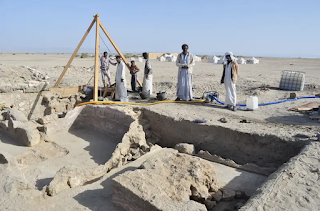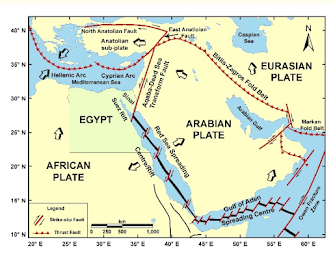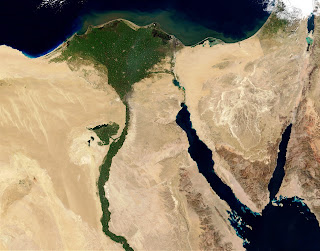Volcanoes in Egypt
Ancient Egyptians abandoned one of their coastal cities more than 2000 years ago, when the supply of fresh water dried up. The cause may have been a major volcanic eruption, possibly on the other side of the world, that triggered a severe drought.
An Egyptian archaeological mission found the lava at the ancient fortress of Tharo near what is now the east bank of the Suez Canal. Tharo was part of a system to defend Egypt from attacks by its enemies to the east.
Tharo is about 900 km (550 miles) from Santorini and Hawass did not say how lava could reach so far. The main damage far from volcanoes is through volcanic ash, which blocks out the sun and can disrupt weather patterns for years.
Hawass linked the destruction to a period of Egyptian history known as the Hyksos era, which ended in about 1570 BC.
There are no active volcanoes to be found today in Egypt, but volcanic gases and sulfate aerosols released by a powerful volcanic eruption into Earth's atmosphere can have widespread effects.
Resources:
Bressan, D. (2021, March 21). Volcanic eruptions may have led to fall of ancient Egyptian civilization. Forbes. Retrieved September 21, 2022, from https://www.forbes.com/sites/davidbressan/2021/03/21/volcanic-eruptions-may-have-led-to-fall-of-ancient-egyptian-civilization/?sh=f134f0728ccf
Thomson Reuters. (2007, April 2). Egypt says has evidence volcano destroyed cities. Reuters. Retrieved September 21, 2022, from https://www.reuters.com/article/idUSL02409086





Hello Egypt!
ReplyDeleteThank you for sharing! I really enjoyed the pictures you provided. It is interesting how Egypt does not currently have any active volcanoes. Spain is fairly similar but our last eruption was in 2021 so that is the one difference they have. I read that Egypt had fairly active volcanoes in Ancient Egypt during the Ptolemaic Era meaning they dealt with two or 3 huge volcanoes.
-Spain